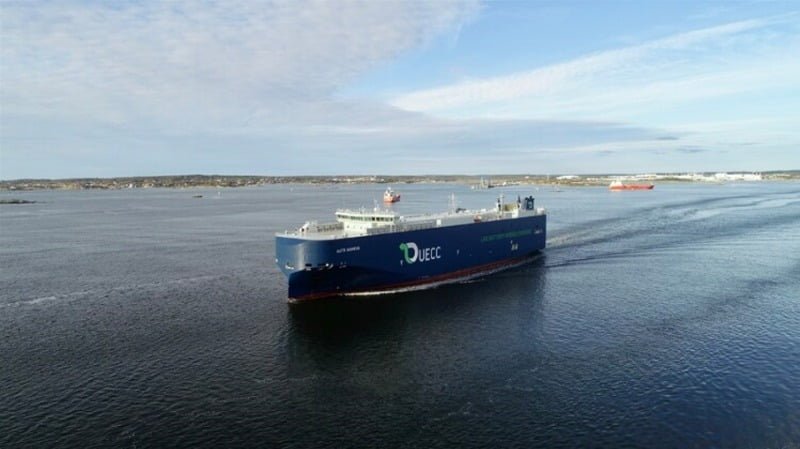United European Car Carriers (UECC), a leader in sustainable shortsea RoRo transport, has announced that its proactive investment in green fuels has enabled it to eliminate surcharges for customers under the newly implemented FuelEU Maritime (FEUM) regulation. This achievement highlights the company’s dedication to environmental responsibility and its strategic foresight in adopting alternative fuel technologies.
Table of Contents
Eliminating Customer Surcharges with Green Fuels
UECC has drastically reduced its financial exposure to the FEUM regulation by significantly expanding the use of low-carbon biofuels and liquefied biomethane (LBM) across its 15-vessel fleet. While many shipping companies face surcharges of 2–5% to compensate for the higher costs of biofuels, UECC has opted not to pass these costs onto its customers.
Daniel Gent, UECC’s Energy & Sustainability Manager, stated “UECC will change absolutely nothing about its pricing structure in relation to FEUM. We are already running a compliance surplus with our current energy mix, and this is expected to extend into the early 2030s.”
Investments Paying Off for Customers and Compliance
UECC’s green fuel strategy has not only met but exceeded regulatory requirements, creating a compliance surplus that will benefit the company’s operations and customers. Its adoption of LBM through partnerships with Titan Clean Fuels and ACT Commodities has fortified the company’s fuel procurement strategy, ensuring a stable supply of alternative fuels.
Gent emphasized the advantages of being ahead of regulatory mandates, stating “This demonstrates the clear benefits of investing in progressive technology and generating savings for our customers. We are delivering on our commitment to insulate our customers from regulatory penalties.”
Comprehensive Decarbonization Strategy
UECC’s efforts go beyond fuel adoption, encompassing eco-friendly newbuilds, operational efficiencies, and technical innovations. The company’s bio-products comply with Renewable Energy Directive (RED) criteria, and all fuels used are ISCC-certified. UECC has also completed its first truck-to-ship LBM refueling operation in Spain, further diversifying its fuel supply chain.
Key elements of UECC’s decarbonization strategy include:
- Newbuilds: Two additional multi-fuel LNG battery hybrid PCTCs are on order.
- Alternative Fuels: LBM and biofuels play a pivotal role in achieving carbon reduction goals.
- Technical Measures: Waste heat recovery systems and advanced hull anti-fouling technologies.
Surpassing Industry Targets
UECC is on track to achieve a 45% reduction in carbon intensity by 2030, well above the International Maritime Organization (IMO) target. The company also expects to exceed the FEUM-mandated reduction of 31% by 2040, based on its 2020 baseline of 91.16 grams of CO₂ equivalent per megajoule.
UECC’s compliance surplus may eventually provide pooling opportunities for third-party vessels under FEUM, further extending the benefits of its investments to other stakeholders.
Looking Ahead: Phasing Out Fossil Fuels
UECC remains committed to phasing out oil-based fossil fuels entirely by 2040. By continuously investing in alternative fuels like LBM and biofuel, the company ensures its operations remain sustainable, cost-effective, and regulatory compliant.
Gent concluded “With the investments we are planning, UECC will never need to buy or borrow compliance units. We are going above and beyond in our commitment to green fuels.”
About UECC
United European Car Carriers (UECC) is a leading provider of sustainable shortsea transportation services for cars and other rolling cargo in Europe. With a focus on innovation and sustainability, the company operates a fleet of eco-friendly vessels, including dual-fuel LNG and hybrid battery-powered PCTCs. UECC is committed to achieving net-zero emissions by 2040 while advancing sustainable practices in the shipping industry.
Source United European Car Carriers

